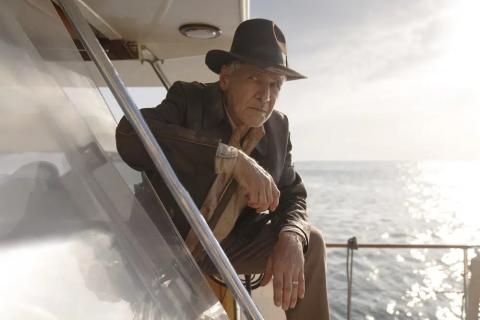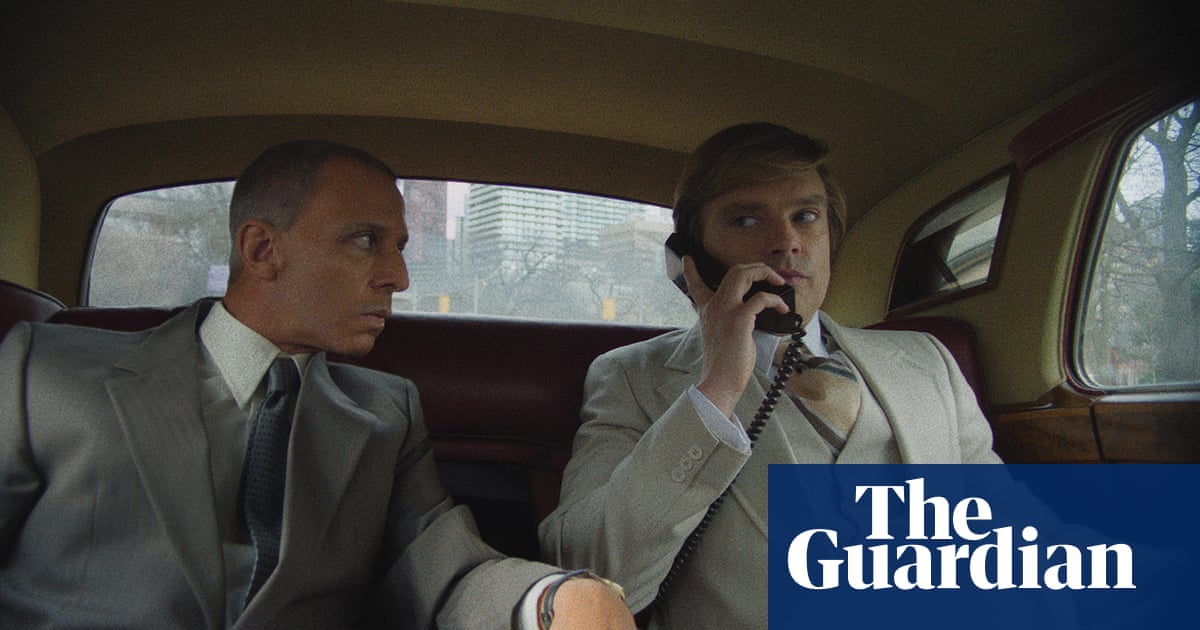
LONDON: It was perhaps fitting that the Lebanese director and artist Ely Dagher, who has spent much of his career dealing with the themes of disillusionment and migration, should end up shooting his debut feature during a revolution. What could be more apt for a man who has sought to explore his relationship with a city as troubled and enigmatic as Beirut.
For the latest updates, follow us on Instagram @arabnews.lifestyle
Filming of “The Sea Ahead,” which stars the French-Lebanese actress Manal Issa, began at the end of 2019 and finished a week before Lebanon’s first lockdown, which meant the crew had to navigate roadblocks, political instability and the country’s financial meltdown. “I mean, we had to bring in money in suitcases to pay the crew,” says Dagher, laughing at the absurdity of it all. “The main producer was French, so the money was there, but you couldn’t transfer any money into Lebanon.”
The crew also had to cope with their own desire to protest. At one point during filming, Dagher and the film’s assistant director, Amanda Kik, abandoned a meeting to join a demonstration in the street outside. On another occasion, Dagher headed downtown to protest instead of making his way to set. “I remember I was driving and I saw the lighting van going in the opposite direction,” he says, laughing once again. “They were going to set and I was going to the protest. I found Manal there as well with the casting guy who was in charge of getting her to the shoot, and then a few others turned up as well. We got to set a bit late but we wanted to be part of this. We couldn’t just be ‘OK, we don’t care about what’s going on, let’s just make a film.’ It was important to stay in touch with what was going on.”
Dagher originally began writing the film’s script during the trash crisis of 2015. (Supplied)
Dagher also worked with the French editor Léa Masson, who, like everybody else, was unable to travel due to COVID-19, which meant they were forced to edit together remotely. Their record was a seven-hour WhatsApp call, with Masson editing and sending cuts across, and Dagher reciprocating. They worked that way until the Beirut explosion, which brought everything to a standstill for almost two months.
Now the film is set to have its world premiere at Cannes during the festival’s Directors’ Fortnight, with four screenings to take place in July. Dagher is no stranger to Cannes, of course. In 2015, his animated short, “Waves ’98,” won the short film Palme d’Or and was the first Lebanese film to compete in the festival’s official competition since Maroun Baghdadi’s “Hors La Vie” in 1991. An exploration of the director’s relationship with Beirut, Dagher’s film was the end result of two years of hard graft and a surrealist blend of multiple styles of animation.
“The Sea Ahead” deals with similar themes, particularly immigration and identity, and is centered around a young woman’s return to Beirut after a number years living abroad. Issa — who has previously appeared in films including “Ulysse & Mona” and “Parisienne” — plays a young woman whose sudden return home, her parents’ inquisitiveness, and her eventual reconnection to the life she previously had in Beirut are the focus of the film. As such, it is an examination of a particular aspect of migration that is rarely explored — that of the returnee.
Filming of “The Sea Ahead” began at the end of 2019 and finished a week before Lebanon’s first lockdown. (Supplied)
“A lot of people in my family had to come back and, along the way, lost everything,” says Dagher, whose younger brother Joh composed the film’s original score. “So when I was seeing people leave again because they’re fed up with the country and have these hopes of fulfilling their lives abroad, I wanted to explore what that really means. It’s not always positive and we don’t really talk about that as much. What does it mean for someone who left for a few years and had to come back?”
In some ways the film mirrors aspects of Dagher’s own life. He has spent many years overseas, living in Belgium and Berlin and studying for his master’s degree in contemporary art theory and new media at Goldsmiths in London. Reconnecting with Beirut and attempting to understand it is therefore something that Dagher has experienced throughout much of his life.
Dagher originally began writing the film’s script during the trash crisis of 2015, but only secured the final slice of funding — $30,000 in grants from the El Gouna Film Festival — in September 2019. Even with three producers onboard, including the main producer, Arnaud Dommerc of Andolfi Production, bringing the film to life was a considerable challenge, not least because of Dagher himself.
“In the beginning I was boxed as the ‘animation director,’ even though that was never really my passion or my goal,” he says. “So that set me back a bit. And I also think, in terms of funding, especially with European funding, that the film was always too subtle for them. I was always pushed to go for a much more didactic approach, much more social context with elements of social drama, which I refused to do. I refused to veer from my vision of the film, and if you stick to what you want, especially when everything is so limited, it’s a long process. So it’s been a very rewarding culmination of five years of work on that level.”
He secured the final slice of funding — $30,000 in grants from the El Gouna Film Festival — in September 2019. (Supplied)
“The Sea Ahead” is, in essence, an amalgam of all of Dagher’s professional passions — writing, editing and directing. “These three things are a huge driving force for me and filming was such an amazing experience. For me, working with actors is one of the most rewarding experiences ever. When we finished the shoot, just the sheer pleasure that we got out of working together on set was enough for me to know that, even before we started editing, we’d done something good. We had a very cohesive relationship and working with Manal, who I had met three years prior to the shoot, was a great experience. We got to know each other, — got to know our interests, where she comes from, where I come from, where the film comes from — and I think it was just obvious that our method of working together was so fluid. Sometimes we’d say ‘Cut’ and everybody would be, ‘OK, that was good." But I’d notice something small that was not quite right and she would notice it too. All it would take was a look between us for us to go, ‘OK, let’s do another take.’ We knew what needed to be fixed.”
Given all that’s happened in Lebanon during the past two years, and with so many people leaving the country, is Dagher tempted to leave once again?
“I mean, this is the question that has been part of my work for so long, and that’s because it’s something that I’ve been questioning for the longest time,” he replies. “So, I don’t know. I’m here for now. I used to say that I’ll stay here for as long as it’s possible to stay here, but where do you draw the line?”












